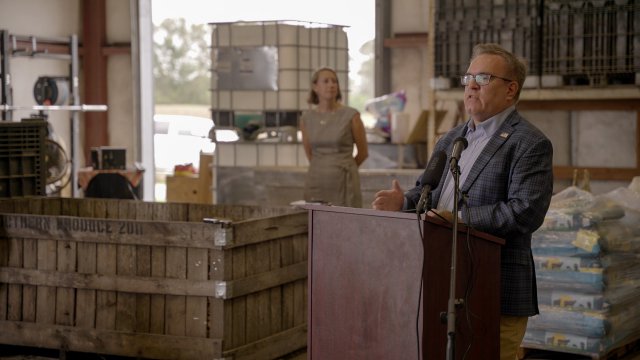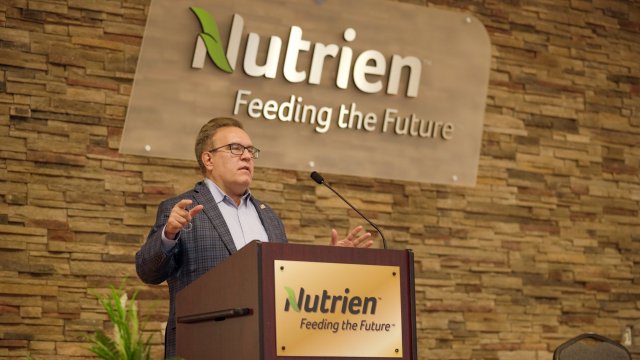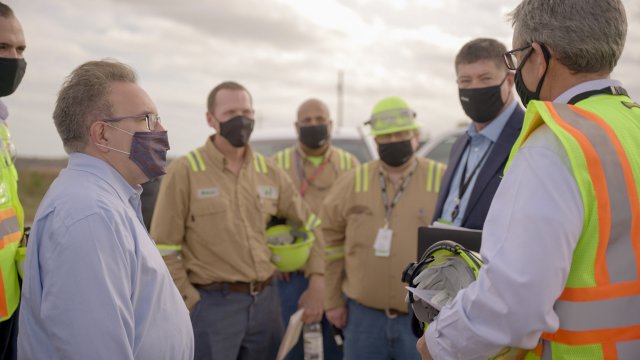Administrator Wheeler Wraps Up Southeast Swing with Agriculture, Air Announcements in North Carolina
Raleigh, N.C. (October 29, 2020) — Today, U.S. Environmental Protection Agency (EPA) Administrator Andrew Wheeler and EPA Region 4 Administrator Mary Walker wrapped up their visit to the Southeast with announcements on the pesticide application exclusion zone (AEZ) requirements with U.S. Congressman David Rouzer (NC-07) and an amendment to the 2015 National Emission Standards for Hazardous Air Pollutants (NESHAP) for Phosphoric Acid Manufacturing.
“This administration continues to show that the country can have both environmental progresses and economic growth at the same time," said EPA Administrator Wheeler. "We will always listen to and be responsive to legitimate stakeholder concerns, whether they be from the agriculture and manufacturer communities or local community groups."
“This action will make it easier for farmers and growers to comply with the Application Exclusion Zone provisions by making them more effective and easier to implement,” said EPA Region 4 Administrator Mary S. Walker. “EPA is also showing commitment to the manufacturing sector with an amendment to the 2015 NESHAP to provide needed clarity to the regulated community.”
At Overman Farms in Goldsboro, N.C. with U.S. Congressman David Rouzer (NC-07), Administrator Wheeler announced the finalization of improvements to requirements for the pesticide application exclusion zone (AEZ) — the area surrounding pesticide application equipment that exists only during outdoor production pesticide applications.
“Once again this Administration is proving their commitment to adhering to the mission of a clean and safe environment while making common sense reforms to rules and regulations that are unnecessarily onerous,” said U.S. Congressman David Rouzer (NC-07). “Administrator Wheeler and his team are a real breath of fresh air for North Carolina’s farm families who go above and beyond to protect the very soil and water necessary to produce the food and fiber that helps feed and clothe America and the world.”
“Farmers must have clear, effective and enforceable pesticide rules to work responsibly and efficiently, and North Carolina Farm Bureau commends the Administration and EPA for updating the pesticide Application Exclusion Zone requirements to reflect that,” said North Carolina Farm Bureau President Shawn Harding. “We appreciate EPA’s continued vigilance over the safe use of pesticides critical to agriculture, while giving farmers the flexibility and trust to grow food, fiber and fuel without excessive burden. Once again, the Administration and EPA Administrator Andrew Wheeler have demonstrated their commitment to sensible, science-based regulatory reform that provides practical and workable guidance to farmers feeding our nation and the world.”
EPA’s targeted changes improve the enforceability and workability of the AEZ requirements, decrease regulatory burdens for farmers, and maintain critical worker protections. These targeted changes include:
-
AEZ requirements only apply within the boundaries of the agricultural establishment, removing off-farm responsibilities that were difficult for state regulators to enforce.
-
Immediate family members of farm owners are now exempted from all aspects of the AEZ requirements. Farm owners and their immediate family are now able to shelter in place inside closed buildings, giving farm owners and immediate family members flexibility to decide whether to stay on-site during pesticide applications, rather than compelling them to leave even when they feel safe remaining.
-
New clarifying language has been added so that pesticide applications that are suspended due to individuals entering an AEZ may be resumed after those individuals have left the AEZ.
-
Simplified the existing criteria to help inform decision-making on whether pesticide applications are subject to the 25- or 100-foot AEZ.
No changes were made to the “Do Not Contact” provision that prohibits a handler/applicator and the handler’s employer from applying a pesticide in such a way that it contacts workers or other persons directly or through drift.
Today, EPA also finalized an amendment to the 2015 NESHAP for Phosphoric Acid Manufacturing. This amendment, which addresses a petition submitted by PCS Phosphate Company, Inc. (now a subsidiary of Nutrien Ltd.) located in Aurora, North Carolina, draws on newly available data in order to make needed revisions to the 2015 NESHAP. It is not expected to result in an increase in mercury or any other hazardous air pollutant. These changes are not expected to result in an increase in mercury or any other hazardous air pollutant (HAP). It is also expected to save approximately $26 million over the next five years, and protect and preserve hundreds of direct jobs in Eastern North Carolina.
“This amendment to the emissions standard for hazardous air pollutants is a big win for North Carolina and will save hundreds of jobs in eastern North Carolina,” said U.S. Senator Thom Tillis. “I want to thank the administration for their continued attention to issues that face our great state and I applaud Administrator Wheeler for putting forth common sense, realistic goals that will ensure jobs stay in North Carolina, while also ensuring our environment is protected for the benefit of future generations.”
“Protecting our farm workers is a top priority of this Administration,” said Assistant Administrator for EPA’s Office of Chemical Safety and Pollution Prevention Alexandra Dapolito Dunn. “Today’s rule ensures that pesticide applicators have clear rules to follow to achieve that outcome.”
###




